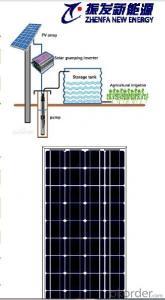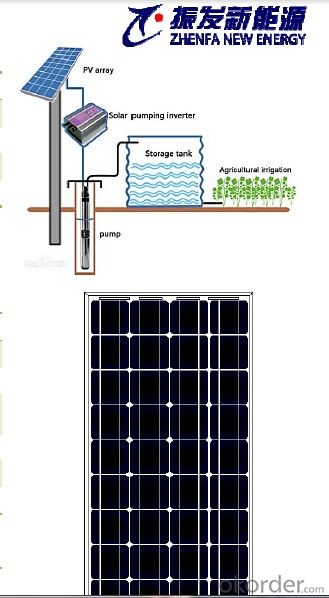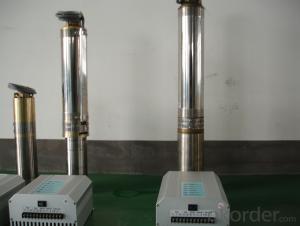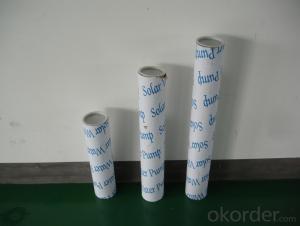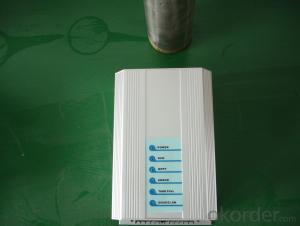Zhenfa 120W-140W Solar DC Pump with Timer
- Loading Port:
- China Main Port
- Payment Terms:
- TT OR LC
- Min Order Qty:
- -
- Supply Capability:
- -
OKorder Service Pledge
Quality Product, Order Online Tracking, Timely Delivery
OKorder Financial Service
Credit Rating, Credit Services, Credit Purchasing
You Might Also Like
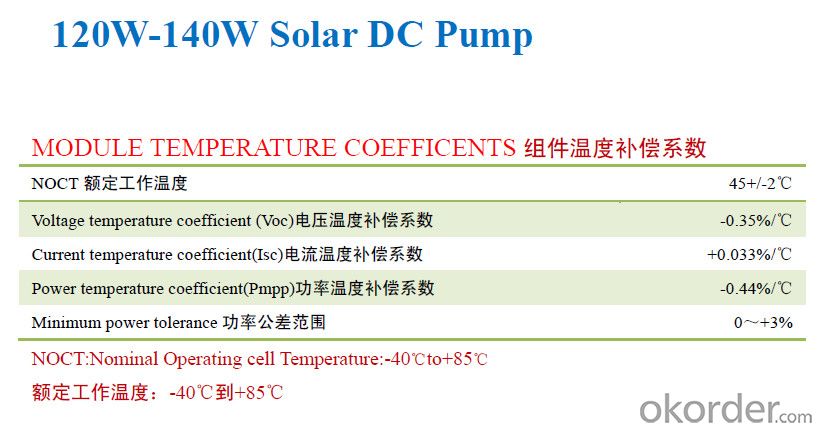
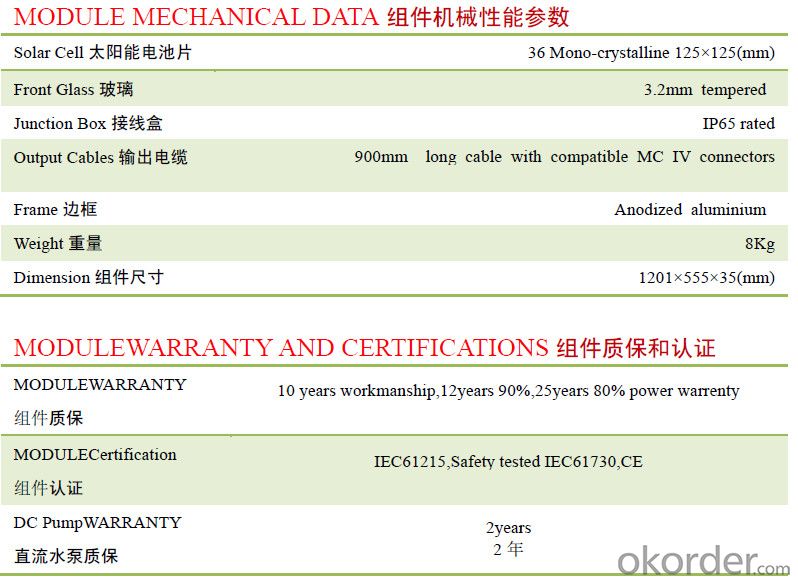
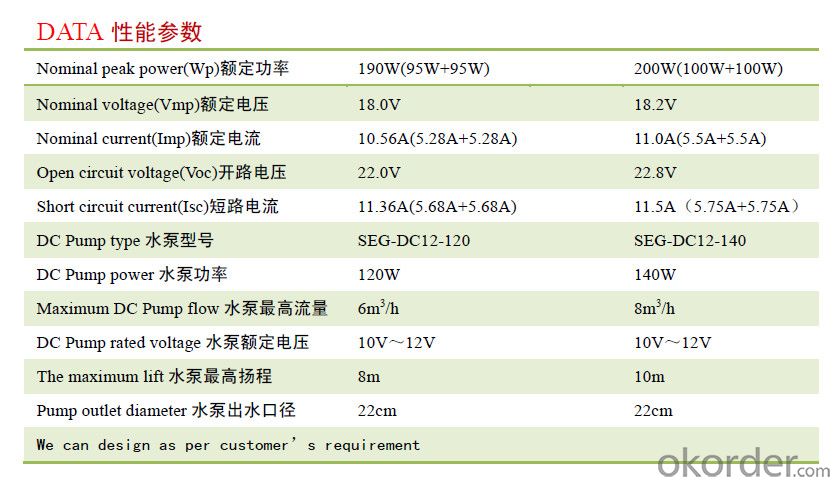
In certain emerging markets, Zhenfa new energy offers home owners complete residential solar system solutions to meet their green energy needs. Zhenfa's residential solar power systems are designed to meet different building applications in system sizes of 1.68kW and 3.9kW. Zhenfa also provides customized solar system solutions for special solar power systemapplications.
- Q: How does a solar pump handle water source contamination from natural disasters?
- A solar pump does not directly handle water source contamination from natural disasters. However, it can play a crucial role in providing access to clean water by utilizing solar energy to pump water from a contaminated source to a treatment facility or storage tanks. The contaminated water can then be treated using appropriate filtration and purification methods to ensure its safety for consumption.
- Q: How does a solar pump help in reducing electricity bills?
- A solar pump helps in reducing electricity bills by utilizing solar energy to power the pump instead of relying on electricity from the grid. This eliminates the need for consuming conventional electricity, which in turn reduces the amount of electricity consumed and ultimately leads to lower electricity bills.
- Q: Are there any limitations to the size of particles a solar pump can handle?
- Indeed, the size of particles that a solar pump can manage is subject to limitations. Generally, solar pumps are engineered to accommodate diminutive particles like sand, silt, or debris that could potentially exist in the water source. Nonetheless, if the particles are excessively sizable or compact, they have the potential to obstruct or harm the pump system. Moreover, larger particles can also impact the pump's efficiency, thus diminishing its performance and output. Consequently, it is crucial to take into account the size and nature of particles present in the water source while selecting a solar pump to guarantee its ability to manage them effectively without any complications.
- Q: Are there any compatibility issues with integrating a solar pump into an existing water system?
- Yes, there can be compatibility issues when integrating a solar pump into an existing water system. Factors such as the size and capacity of the existing system, voltage requirements, and flow rates need to be considered to ensure proper integration. Additionally, compatibility with control systems, wiring, and water quality requirements should also be evaluated. It is important to consult with experts or professionals to assess any potential compatibility issues before integrating a solar pump into an existing water system.
- Q: Can a solar pump be used in areas prone to hurricanes or strong winds?
- Yes, a solar pump can be used in areas prone to hurricanes or strong winds. However, it is important to ensure that the solar pump system is securely installed and protected to withstand these extreme weather conditions. This may involve using sturdy mounting structures, reinforcing the system, and implementing proper maintenance and inspection protocols.
- Q: How does a solar pump work?
- A solar pump works by harnessing energy from the sun through solar panels. The panels convert sunlight into electricity, which powers the pump to draw water from a source such as a well or a reservoir. This renewable energy solution eliminates the need for grid electricity or fuel, making it both cost-effective and environmentally friendly.
- Q: Can a solar pump be integrated with existing water systems?
- Indeed, it is feasible to incorporate a solar pump into current water systems. Solar pumps are designed to be adaptable and can be effortlessly linked to existing water systems. The primary prerequisite is a solar energy source, typically in the form of solar panels, to supply power to the pump. Once the solar panels are connected to the pump, appropriate plumbing connections can be employed to integrate it into the existing water system. Consequently, the solar pump can extract water from the source and distribute it through the pre-existing pipelines, tanks, or irrigation systems. Although the integration process may vary depending on the specific configuration of the water system, it is absolutely possible to seamlessly integrate a solar pump into an existing water system with the appropriate expertise and equipment.
- Q: Can a solar pump be used for desalination or reverse osmosis processes?
- Yes, a solar pump can be used for desalination or reverse osmosis processes. In these processes, a solar pump is used to provide the necessary energy to drive the water through the reverse osmosis membrane or desalination unit. Solar pumps are an environmentally friendly and cost-effective solution for these applications as they harness solar energy to power the pumps, eliminating the need for traditional electricity sources. Additionally, solar pumps can be easily installed in remote areas where access to electricity may be limited. This makes them particularly suitable for desalination or reverse osmosis processes in regions with abundant sunlight but scarce freshwater resources. Overall, utilizing a solar pump for desalination or reverse osmosis processes offers a sustainable and efficient solution to address water scarcity issues.
- Q: Can a solar pump be used in areas with strict emissions regulations?
- Yes, a solar pump can be used in areas with strict emissions regulations. Solar pumps operate using renewable energy, which means they do not produce any emissions or pollutants during their operation. This makes them an environmentally friendly solution that complies with strict emissions regulations.
- Q: Can a solar pump be used for geothermal heating and cooling?
- Geothermal heating and cooling systems rely on the earth's core for their heat source, whereas solar pumps are not equipped to tap into this geothermal energy. Solar pumps are designed to use solar energy for powering various applications, but they are not specifically designed for geothermal purposes. While solar energy can be utilized in certain components of a geothermal system, it cannot substitute the essential geothermal heat exchange process that these systems depend on.
Send your message to us
Zhenfa 120W-140W Solar DC Pump with Timer
- Loading Port:
- China Main Port
- Payment Terms:
- TT OR LC
- Min Order Qty:
- -
- Supply Capability:
- -
OKorder Service Pledge
Quality Product, Order Online Tracking, Timely Delivery
OKorder Financial Service
Credit Rating, Credit Services, Credit Purchasing
Similar products
Hot products
Hot Searches
Related keywords
